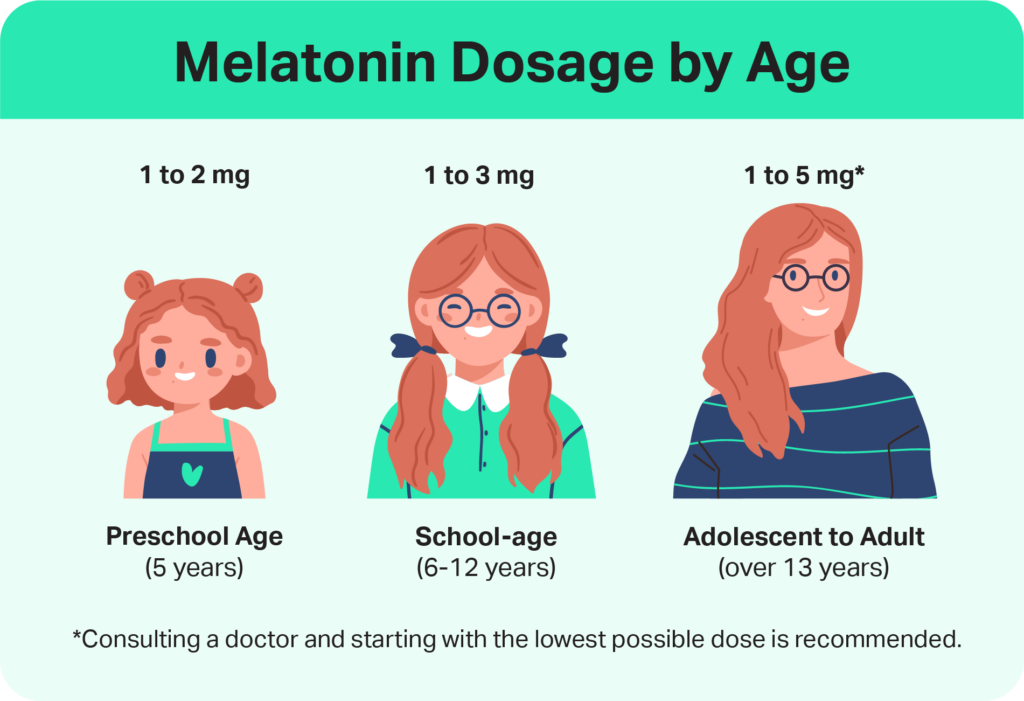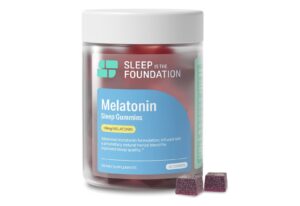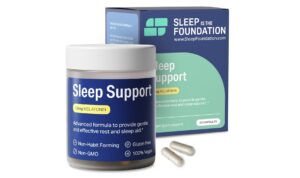When you buy through our links, we may earn a commission. Products or services may be offered by an affiliated entity. Learn more.
Melatonin Dosage: How Much Melatonin to Take
At a Glance
Most adults are advised to start with 0.5 to 1 milligram of melatonin, gradually increasing the dose if needed. A typical dose ranges from 1 to 3 milligrams, taken about 30 minutes before bedtime, with most people rarely needing more than 5 milligrams. Experts recommend taking no more than 10 milligrams of melatonin at a time.
Melatonin is a hormone your body naturally produces to help regulate your sleep-wake cycle. As light fades in the evening, melatonin levels rise, signaling to your body that it’s time to wind down and prepare for sleep. Because of this, melatonin supplements have become increasingly popular for people dealing with insomnia, jet lag, delayed sleep phase syndrome, or other circadian rhythm disruptions.
However, as use of melatonin supplements grows, so do concerns about improper dosing and potential overuse. Understanding what melatonin does — along with how supplements are regulated and how much to take — is key to using it safely and effectively.
How Much Melatonin Should You Take?
While there’s no officially recommended melatonin dose, most people who take melatonin for sleep take between 1 and 5 milligrams 30 minutes before bedtime. Melatonin products are sold in doses that range from 200 micrograms to 20 milligrams and come in a variety of forms:
- Tablets
- Capsules
- Gummies
- Liquid drops
- Melts or lozenges
- Patches
- Sprays
Melatonin Dosage for Adults
Experts recommend starting with a lower dose of melatonin, typically around 0.5 to 1 milligram, taken 30 to 60 minutes before bedtime. Starting low allows you to gauge how your body responds and helps reduce the risk of potential side effects of melatonin, such as grogginess or vivid dreams. If needed, the dose can be gradually increased by 1 milligram at a time, but most adults find that doses between 1 and 3 milligrams are effective for sleep problems like insomnia or jet lag.
The ideal dosage varies by individual, and factors like age, body weight, sensitivity to melatonin, existing health conditions, and the reason for taking it can all influence how your body responds. As with any supplement, it’s best to consult a healthcare provider before starting melatonin, especially if you take other medications or have underlying health conditions.
Our Recommendation:
Since an ideal dose for adults can range anywhere between .5 and 3mg, getting 3mg pills and splitting them up as necessary is a good place to start. We’ve reviewed dozens of popular melatonin brands, looking at whether they have reputable certifications, transparent labeling, and other sleep-inducing ingredients. Among our favorites is the Momentus Elite Sleep Supplement, which is a blend of 3mg melatonin with tart cherry extract, L‑theanine, and valerian root.
Melatonin Dosage for Older Adults
Adults older than age 65 should speak with a doctor before taking any melatonin supplements. Melatonin supplement use has not been widely studied in this age group and may come with additional risks. Experts suggest older adults use the lowest possible dose for a short, rather than long, period of time.
Melatonin Dose for Kids
Melatonin supplements may be safefor kids, but it has not been widely studied, and parents and caregivers should talk to a doctor before giving children melatonin.
For a child with insomnia, melatonin doses are often given based on the child’s age. Preschool children are often given a 1- to 2-milligram dose, school-aged children are often given a 1- to 3-milligram dose, and adolescents are often given a 1- to 5-milligram dose.
Before giving melatonin, parents and caregivers may first want to try other strategies for improving their child’s sleep, like avoiding electronics at night, keeping the bedroom a comfortable temperature, setting a consistent bedtime, and engaging in a nightly routine.

When Should You Take Melatonin?
Melatonin is most effective when taken 30 to 60 minutes before bedtime. This gives your body time to absorb the supplement and begin feeling its calming effects as your natural melatonin levels rise. Timing is key — taking melatonin too early or too late may interfere with your sleep-wake cycle rather than help it.
To get the most benefit:
- Take melatonin at the same time each night to help reinforce a consistent sleep schedule.
- Avoid alcohol, caffeine, and heavy meals in the hour or two before taking melatonin, as these can counteract its effects.
- Create a relaxing pre-bed routine to support melatonin’s natural role in signaling the body it’s time for sleep.
As always, follow the dosage instructions on the product label or those provided by your doctor and avoid taking more than recommended unless advised by a healthcare professional.
Is It OK to Take Melatonin Every Night?
For most people, melatonin is considered safe to take nightly for short-term use. Research shows that melatonin is not habit-forming, and unlike many sleep medications, it doesn’t typically cause a “hangover” effect the next day. That makes it a popular option for people managing jet lag, shift work, or occasional sleeplessness.
That said, experts recommend using melatonin as a tool to support better sleep habits — not as a permanent fix. If you find yourself relying on it night after night, it may be a sign of an underlying sleep disorder or poor sleep hygiene. In these cases, addressing the root cause (with the help of a doctor or sleep specialist) is often more effective than continuing long-term supplementation.
Parents should also talk to a pediatrician before giving melatonin to children, as long-term effects in kids are still being studied.
In short: Occasional, nightly use of melatonin is likely safe for adults, but regular dependence may signal it’s time to take a closer look at your sleep health.
How Much Melatonin Is Too Much?
There’s no universally agreed-upon maximum dose of melatonin, but experts generally recommend staying below 10 milligrams per night for adults. In fact, studies show that lower doses — even as little as 0.5 to 1 milligram — can be just as effective as higher doses for promoting sleep in many people.
People with kidney or liver conditions may process melatonin more slowly, which can increase the risk of side effects even at lower doses. Always check with your doctor before taking melatonin if you have a medical condition or take medications that affect hormone levels or sleep.
Can You Overdose on Melatonin?
Although melatonin is unlikely to be toxic or fatal, taking too much can lead to uncomfortable and disruptive symptoms. Children are especially sensitive to melatonin, and accidental ingestion of high doses can lead to serious side effects that may require medical attention. That’s why melatonin should always be stored out of reach of children and taken exactly as directed.
What Are the Side Effects of Taking Too Much Melatonin?
Possible side effects of high doses or frequent use of melatonin include:
- Daytime drowsiness or grogginess
- Headaches
- Dizziness or nausea
- Vivid dreams or nightmares
- Irritability or mood changes
- Hormonal effects (particularly in children or adolescents)
Taking more melatonin doesn’t necessarily improve sleep — and in some cases, it may disrupt your sleep-wake cycle even more. If you experience ongoing side effects or melatonin stops being effective, it’s best to consult a healthcare provider for guidance.
Who Should and Shouldn’t Take Melatonin?
Melatonin can be helpful for certain sleep issues, but it’s not right for everyone. Understanding who may benefit — and who should be cautious — is key to using it safely and effectively.
Who May Benefit From Melatonin
- People with occasional insomnia who have trouble falling asleep
- Shift workers who struggle to sleep during daylight hours
- Travelers dealing with jet lag, especially when crossing multiple time zones
- Children with neurodevelopmental disorders, such as ADHD or autism spectrum disorder — but only under medical supervision
- Older adults, whose natural melatonin production often decreases with age
Who Should Avoid or Use With Caution
- Children under age 3, unless recommended by a doctor
- People with autoimmune disorders, since melatonin may stimulate the immune system
- Those taking blood thinners, immunosuppressants, or diabetes medications, as melatonin may interact with these drugs
- Pregnant or breastfeeding individuals, due to limited safety data
- People with depression or seizure disorders, as melatonin may exacerbate symptoms in some cases
The safety and efficacy of supplements is not closely monitored by the U.S. Food and Drug Administration (FDA). Shoppers should take additional measures to make sure they are purchasing reputable products.
Frequently Asked Questions
Does melatonin require a prescription?
In the United States, melatonin is available over the counter and does not require a prescription. It’s sold as a dietary supplement in forms like gummies, tablets, capsules, and liquids. However, in some other countries — including parts of Europe, Australia, and Japan — melatonin does require a prescription because it is regulated as a medication rather than a supplement.
How much melatonin should I take for jet lag?
Experts recommend taking between .5 and 10 milligrams of melatonin for jet lag. Three milligrams is enough for most people.
Is it safe to take melatonin with alcohol?
Do not take melatonin supplements with alcohol. Alcohol can disrupt both your sleep quality and your natural melatonin levels.
What happens if you take melatonin with caffeine?
Taking melatonin with caffeine can reduce the effectiveness of melatonin and interfere with your sleep. Caffeine is a stimulant that promotes alertness by blocking adenosine, a chemical that makes you feel sleepy. Melatonin, on the other hand, signals to your body that it’s sleep time.
When taken together, caffeine may counteract melatonin’s effects, making it harder to fall asleep or get the full benefit of the supplement. To avoid this, limit caffeine intake at least six hours before bedtime if you plan to use melatonin.

Still have questions? Ask our community!
Join our Sleep Care Community — a trusted hub of sleep health professionals, product specialists, and people just like you. Whether you need expert sleep advice for your insomnia or you’re searching for the perfect mattress, we’ve got you covered. Get personalized guidance from the experts who know sleep best.
References
6 Sources
-
Neubauer, D. N. (2023, August 22). Pharmacotherapy for insomnia in adults. In R. Benca & J. G. Elmore (Eds.). UpToDate.
https://www.uptodate.com/contents/pharmacotherapy-for-insomnia-in-adults -
National Center for Complementary and Integrative Health (NCCIH). (2022, July). Melatonin: What you need to know. NCCIH.
https://www.nccih.nih.gov/health/melatonin-what-you-need-to-know -
Vural, E. M., van Munster, B. C., & de Rooij, S. E. (2014). Optimal dosages for melatonin supplementation therapy in older adults: a systematic review of current literature. Drugs & aging, 31(6), 441–451.
https://pubmed.ncbi.nlm.nih.gov/24802882/ -
Owens, J. A. (2023, May 25). Pharmacotherapy for insomnia in children and adolescents: A rational approach. In R. D. Chervin & A. F. Eichler (Eds.). UpToDate.
https://www.uptodate.com/contents/pharmacotherapy-for-insomnia-in-children-and-adolescents-a-rational-approach -
Savage, R. A., Zafar, N., Yohannan, S., & Miller, J. M. (2022, August 8). Melatonin. StatPearls [Internet].
https://www.ncbi.nlm.nih.gov/books/NBK534823/ -
Goldstein, C. A. (2023, October 17). Jet lag. In R. Benca & A. F Eichler (Eds.). UpToDate.
https://www.uptodate.com/contents/jet-lag



















